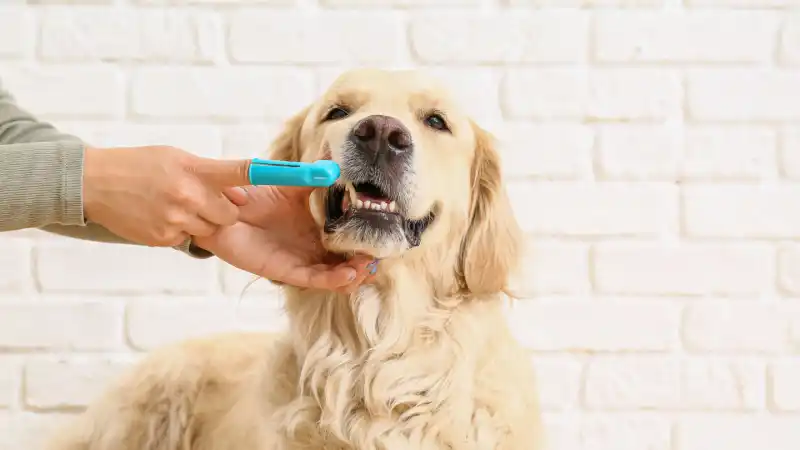How to Tell if Your Dog Is Sick: 11 Common Symptoms
If you’ve ever wondered how to tell if your dog is sick, here are 11 signs of dog illness to be aware of, and a few tips on dog insurance to help you along.

Dogs don't have the ability to tell us how they feel. However, anyone who has ever had a furry friend knows that canine body language can be very expressive. Dogs will instinctively hide how they feel in the early stages of an illness. Because you know your dog, you may be able to pick up on some subtle changes in their personality and actions.
These subtle changes usually indicate that something is wrong. The key to helping your dog recover quickly is noticing that there is a problem as soon as possible. Here are 11 warning signs that will help you answer the question, "Is my dog sick?", so you can determine whether or not they are in need of veterinary attention.
11 Common Signs Your Dog Is Sick and Needs to See a Vet
Vomiting or Diarrhea
Vomiting and/or diarrhea are the most common reasons to seek veterinary help and often the first symptoms of dog illness. The problem can be mild and transient or life-threatening. These signs can be caused by a diet change, getting into the trash, viral or bacterial infections, motion sickness, parvovirus in puppies, or from ingestion of a foreign object.
If your dog had one episode of vomiting or diarrhea from an upset stomach and is acting normally, observe for any progression in symptoms. A bland wet food, such as that made of boiled chicken or hamburger mixed with rice, can be fed in small amounts for a day or two until symptoms are resolved.
The next step, after you have established that your dog is no longer vomiting or having loose stool, is to mix in dry food. However, when symptoms occur multiple times in 24 hours, and are associated with weakness, lethargy, lack of appetite, or unproductive vomiting (dry heaves), please call your veterinarian.
Increased or Decreased Urination
Dogs who are properly house-trained won’t suddenly start urinating around the home without a good reason. Be mindful of the following signs:
Straining to urinate
Changes in urine volume (an increase or decrease)
Blood in the urine
These signs are especially important to note in senior dogs. Excessive amounts of urination may indicate an issue with the kidneys or diabetes mellitus. Bloody urine can indicate a urinary tract infection, bladder stones, blood problem, or cancer.
If your dog is straining to urinate, you see blood, or they’re frequently urinating, call your veterinarian for an appointment. If possible, take a sample of the urine with you.
Loss of Appetite
Most dogs have their own eating habits and may eat more food on some days than on others. Appetite loss is a symptom of many different problems. Some can be mild and others serious. When associated with bad breath, conditions like anorexia can indicate dental disease.
You can try offering your dog some of their favorite treats or a small amount of cooked chicken or hamburger. If the problem lasts more than a day or is associated with other symptoms like lethargy, vomiting, and weakness, the best course of action is to see your vet.
Change in Drinking Habits
Drinking more water or less water than usual may be a sign that your dog is ill. Drinking too little can indicate not feeling well and drinking too much water can indicate that your pet has a fever, hormone issues, diabetes, or kidney disease.
Monitor your pet’s water intake. If they are drinking less, you can try adding more water bowls around the house or flavoring water with chicken broth. If they are drinking more, check to see if they are also urinating more. If the problem persists, see your vet and take a urine sample if possible.
Unexplained Weight Loss or Gain
Sudden weight loss or gain can be a sign of a health issue. This sign may take a few weeks to notice.
Unexplained weight gain or loss can be caused by a variety of conditions and is always a concern. The best approach is to have your dog evaluated to find the underlying cause.
Changes in Personality
When dogs are in pain or don't feel well, they tend to display behavioral changes, such as decreased activity or lethargy. Some sick dogs that are normally social may start to withdraw. A kind and energetic pet may begin to show snippiness or aggression.
Notice if your dog growls when you get close to a particular area of the body that may be the source of discomfort. Not all sick dogs will display negative behavior when they are ill. Some dogs may become clingy or show signs of increased neediness. Some just display changes in their routine, which is typical for dogs with canine cognitive dysfunction.
Monitor your dog for additional symptoms, such as lack of appetite, abdominal pain, vomiting, diarrhea, lameness, or straining to urinate. If you notice significant alterations in your dog's behavior or additional symptoms, contact a licensed veterinarian.
Coughing, Wheezing, or Trouble Breathing
Coughing, wheezing, trouble breathing, and nasal discharge are all signs of a respiratory problem. These symptoms can range from a simple cold to canine flu, kennel cough, or heart failure. Hearing a honking noise can indicate a condition called tracheal collapse that is common in some small dog breeds.
If your dog has difficulty breathing or a blue tint to the tongue and gums, consider this a medical emergency. An occasional cough should be closely monitored and, if it doesn’t resolve or is associated with other symptoms, it should be evaluated. Any sudden change in dog health can be a life-threatening emergency!
Hair Loss/Itchy Skin
Hair loss, also known as alopecia, or persistent itching can be caused by skin infections, fleas, or allergies. This can cause extreme discomfort.
Examine your dog’s skin for fleas, signs of flea dirt (which looks like fresh ground pepper), redness, discharge, swelling, pain, or an abnormal odor. Mild symptoms can be soothed with a bath, but more severe signs should be evaluated by a veterinarian.
Stiffness/Lameness/Difficulty Rising
Trouble walking or limping can be caused by arthritis, hip dysplasia, joint problems, infections such as Lyme disease, or a broken bone.
Minimize your pet’s activity if they are lame or stiff. If the symptom is mild and all else is normal in their behavior, you may be able to give your dog a day of rest. If you are worried or the problem persists, see your veterinarian.
Eye Changes
Red eyes, runny eyes, squinting, or holding the eye closed can be signs of problems that range from a mild infection to an ulceration or glaucoma.
If your dog is pawing or rubbing at the eyes, try to stop this behavior and call your vet. Rubbing at the eye can cause serious damage. An e-collar may be required in addition to medication administration as prescribed by your vet.
Pale Gums
The best way to assess your dog’s gum color is by lifting the lip and looking at the gum tissue. Normal dogs have pink, moist gums. Dogs with pale gums can be anemic or suffering from shock. All the possible causes can be serious.
It your dog has pale gums, is lethargic, weak, or having trouble breathing, this can be a medical emergency. Call your veterinarian or closest veterinary emergency clinic for immediate medical attention.
Taking Your Sick Dog to See a Vet
Unfortunately, your pet won't walk up to you and say that they are sick. For this reason, it's important for dog owners to notice the early symptoms as soon as possible. If you want to know how to tell if your dog is sick quickly and without guessing, schedule an appointment with your veterinarian if your dog displays any of these signs. Your vet will want your dog’s history and may do testing.
Share Your Dog's Health History
Your veterinarian may ask for the following:
Dog health history, including any past medical procedures
Current medications
Symptoms your dog is displaying. This includes when they started, how frequent they are, and any other comments about the nature of their symptoms.
Pet Insurance for Your Dog's Visit to the Vet
Did you know that the average cost of a veterinary emergency visit is $800 to $1,500!
When you start to consider how much exams, tests, and treatments can cost, signing up for a dog health insurance plan starts to make a lot of sense.
What's Covered?
Dog insurance can help cover the cost of the examination, office visits, emergency visits, medical treatment, surgery, and even appointments to see veterinary specialists.
You can go to any vet in the US or Canada without restriction. Your insurance may also include a wellness plan that covers routine exams, vaccines, flea, tick, and heartworm prevention, and even dental cleanings.
Physical Exam– An examination helps to identify physical changes by taking your dog’s temperature, listening to the heart and lungs, and physically examining the body. This can help your vet potentially diagnose the issue and provide you with recommendations.
Blood work– Blood tests can consist of a complete blood count (CBC), biochemical profile, thyroid levels, heartworm testing, and more. This information is important to help diagnose conditions like infections, anemia, kidney disease, hepatitis, and diabetes.
X-Rays– Radiographs are an excellent way to diagnose many different problems, such as fractures, heart failure, tumors, and much more.
One thing to keep in mind is that most pet insurance providers exclude pre-existing conditions, denying coverage for injuries or illnesses that occur before a policy. AKC Pet Insurance (underwritten by Independence American Insurance Company) is the ONLY brand that offers incurable pre-existing condition coverage after a 12-month waiting period*.
*Not available in all states. Pre-existing condition coverage requires a 12-month waiting period.
The information provided in this blog is intended for educational purposes only and should not serve as a substitute for the professional medical advice of your veterinarian. Always consult your veterinarian with questions about your pet’s health and before initiating any treatment regimes.

Every Dog and Cat Deserves the Pet Insurance of Champions
Get prize-winning care for your pets.

Abby Drexler is a contributing writer and media specialist for Pop Your Pup. She regularly produces content for pet blogs dealing with how to care for and love your pet.
READ MORE ARTICLES

